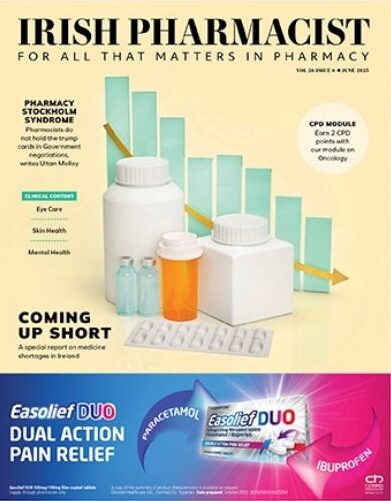Terry Maguire looks more closely at the evidence for statin use, including the potential side-effects
I came to statin treatment in a bizarre way. I went to my bank to arrange a loan and having agreed the amount, the bank asked for additional life cover. The life assurance company, in view of my advancing years (I was 48), required a medical and everything came back tip-top, except my cholesterol level, which weighed in at a handsome yet shocking 9.2mmol/L. I was put on a statin and a decision on the life assurance reserved for six weeks, at which time my cholesterol was down impressively to 5.1mmol/L. Then the life assurance company quoted a rate that could only apply to a ninety-year old with a terminal illness, so I told them to stuff it and threatened to change banks; a tactic I should have used in the first place. I got my loan without the life premium but now I had a cholesterol problem.
Two years later, having reflected on the science, I stopped taking the statin and I felt much better. My high cholesterol level, a genetic gift from the maternal side of the family, is not a disease, merely a coronary risk factor so I reduced my overall risk by means other than taking a daily statin. My statin gave me migraine, a condition I had never experienced before, and there was at that time a signal in the medical literature, a weak signal, suggesting that long-term statin use and degenerative brain disease might be linked. So I stopped them.
Ten years later, a chest pain incident walking on Cavehill caused me to visit my GP, who after telling me to stay off Cavehill, referred me for a routine cardiac assessment, which turned out to be anything but routine. I was whisked into hospital and a stent was inserted into one of my coronary arteries. I was severely admonished by a consultant for stopping my statins and I was back on a higher dose.
In the 1980s, reducing cholesterol to reduce heart disease was first established and became an unassailable fact. The initial treatments were impossible to take and therefore statins, with their outstanding efficacy and safety, were a Godsend when first introduced in the late 1980s. The now-famous statin studies, for example — the 4S (Scandinavian Simvastatin Survival Study) and the WOSCOP (West of Scotland Coronary Prevention Study) established beyond reasonable doubt that where cholesterol levels are reduced, the number of heart attacks and heart deaths fall.
So good were the study results that current UK guidelines recommend that anyone with a 10 per cent chance of having a heart attack in the next 10 years should take a statin. Great! No so great, actually. Two medical authors, James Le Fanu and Malcolm Kendrick, have written critically on the safety and efficacy of statins. They use data from the main studies to make the case that over the last 40 years, we may all have been part of a mighty medical and financial con. For heretics, they are pretty good at maths and slowly lead numeric illiterates such as I through the details of the study numbers.
The studies present population statistics showing that there is a 30 per cent reduction in heart deaths in those taking statins, but these studies prove less predictive for individuals. Individual benefit is calculated using a measure called numbers needed to treat (NNT); for primary prevention (not having heart disease), 250 people must take a statin daily for five years to avoid one coronary death. ‘That can’t be right’, I hear you say, but it is. A more recent review of studies by the BMJ found that three-quarters of trials reported no mortality benefits from statin use and have reported no benefit for heart diseases at all.
Even in high risk patients, such as I, 39 people need to take a statin for five years to avoid one heart event, that is, 38 high-risk patients get no benefit
But even if, as some trials suggest, you are less likely to die of heart disease when you take a statin, you end up dying of something else, such as cancer. Even in high-risk patients such as I, 39 people need to take a statin for five years to avoid one heart event, that is, 38 high-risk patients get no benefit. Authors in the BMJ study comment that normally, the existence of such contradictory evidence usually leads to a paradigm shift or a modification of the theory (lowering cholesterol reduces deaths), but this evidence has been largely ignored as it does not fit the prevailing orthodoxy.
I now realise that I have many of the listed side-effects, and they are not trivial. Muscle pain, memory lapses, exhaustion; I just thought I was getting older, not that I was being poisoned by my own life-saving medicine. So I decided to stop for August and now October has arrived, I have not felt so well for ages and I am reluctant to return to my daily dose.
I am genuinely anxious, reader: If you are taking statins, do not stop until they get the right information for yourself and then, and only then, with informed choice. Cholesterol is not all bad; it makes sex hormones and is a component of every cell in your body. Those who have high cholesterol levels get some benefit from this over the age of 60; there seems to be protection against infection and cancer as we get older. I reason I must die of something and if higher cholesterol guards against cancers as I age, I will not need to worry too much about how life assurance actuaries define my chances of survival or my ability to get a bank loan.
Further Reading
- James La Fanu, Too Many Pills, Amazon.
- Malcolm Kendrick, A Statin Nation.
- Carolina Total Wellbeing Cholesterol Controversies.
- European Scientist Controversies Cholesterol.
- BMJ Evidence Based Medicine, ‘Hit or Miss: The new cholesterol targets’.








